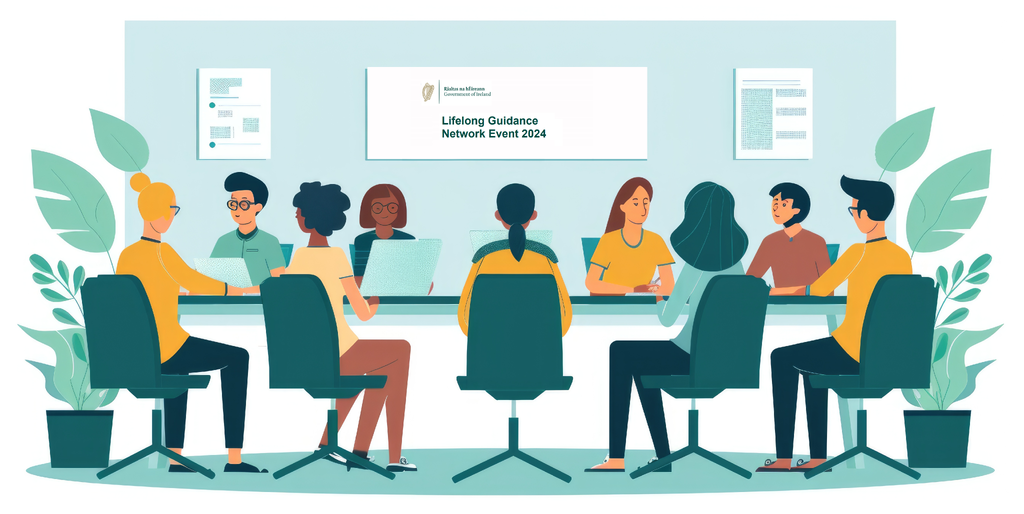
In Issue 58 of the INOU’s e-bulletin we had an article describing the new National Strategic Framework for Lifelong Guidance 2024-2030 . On May 7th, 2024 the Department of Education organised the first Lifelong Guidance Network Event under this Framework. The event aimed to “facilitate discourse on implementation of lifelong guidance to 2030 and showcase exemplars of lifelong guidance across Ireland”.
There are five Government Departments working in the National Policy Group for this Framework: Education; Further and Higher Education, Research, Innovation and Science; Children, Equality, Disability, Integration and Youth; Enterprise, Trade and Employment; and Social Protection. Amongst the first items on the agenda were these Departments sharing their work on guidance and related topics. For example, DFHERIS gave an update on the roadmap to develop a Single National Careers Portal. DETE noted the link between the work of the Expert Group on Future Skills Needs and lifelong guidance, in particular “A coherent approach to lifelong guidance is consistent with the EGFSN’s goals to ensure that future skills gaps are minimised in the economy”.
The following four actions were discussed in a roundtable format:
- Action 1.1: Identify and map the continuum of lifelong guidance and interconnections between services in the current lifelong-guidance system. Identify any possible areas of duplication and potential gaps, if any, for innovative development and enhancement.
- Action 1.3: Enhance modes of communication between sectors and services.
- Action 3.4: Seek to support all individuals including those who are marginalised or have disabilities to access person-centred opportunities such as work-shadowing/work-experience.
- Action 8.1: Seek to enhance the provision of access to guidance at key stages so that an individual may upskill and retrain, thereby enabling career mobility of the workforce.
Towards the end of this event five exemplars of lifelong guidance from across Ireland were highlighted which cover the following issues:
- Including People with A Disability; Benefits of Adopting a Universal Designed Approach;
- Adult Guidance Practice in Employment Services;
- FET Guidance & Information services;
- Development of Pathways in Senior Cycle;
- Leading Career Development and Employability in Higher Education.
The INOU facilitated one of the roundtable discussions on Action 3.4 which seeks “to support all individuals including those who are marginalised or have disabilities to access person-centred opportunities such as work-shadowing/work-experience.” Amongst the issues raised were “The importance of hearing the voice of the learner, the voice of the employer: in particular on courses where work placements are an integral part.” How “navigating the system is a challenge and this can carry through into the workplace.” “The importance of guidance holding a safe space for people; the need for a framework to link people to other supports and services as required.” It was noted that “There is a shock to becoming unemployed; to losing one’s job; in realising that one’s job is no longer sustainable. People changing employment may not have done a CV or formal interview in many years, or in some cases ever if jobs were accessed through familial / communal contacts.”
Further information on this Framework and related Action Plan is available on the Department of Education’s website on their Guidance page. It is important to note that though this Department’s work focuses primarily on the school system, the Framework covers people of working age, people who are seeking employment, education and training advice and guidance. To that end mapping the services that are available and how people can access them will be vital to ensure lifelong guidance becomes a reality and easy to access.